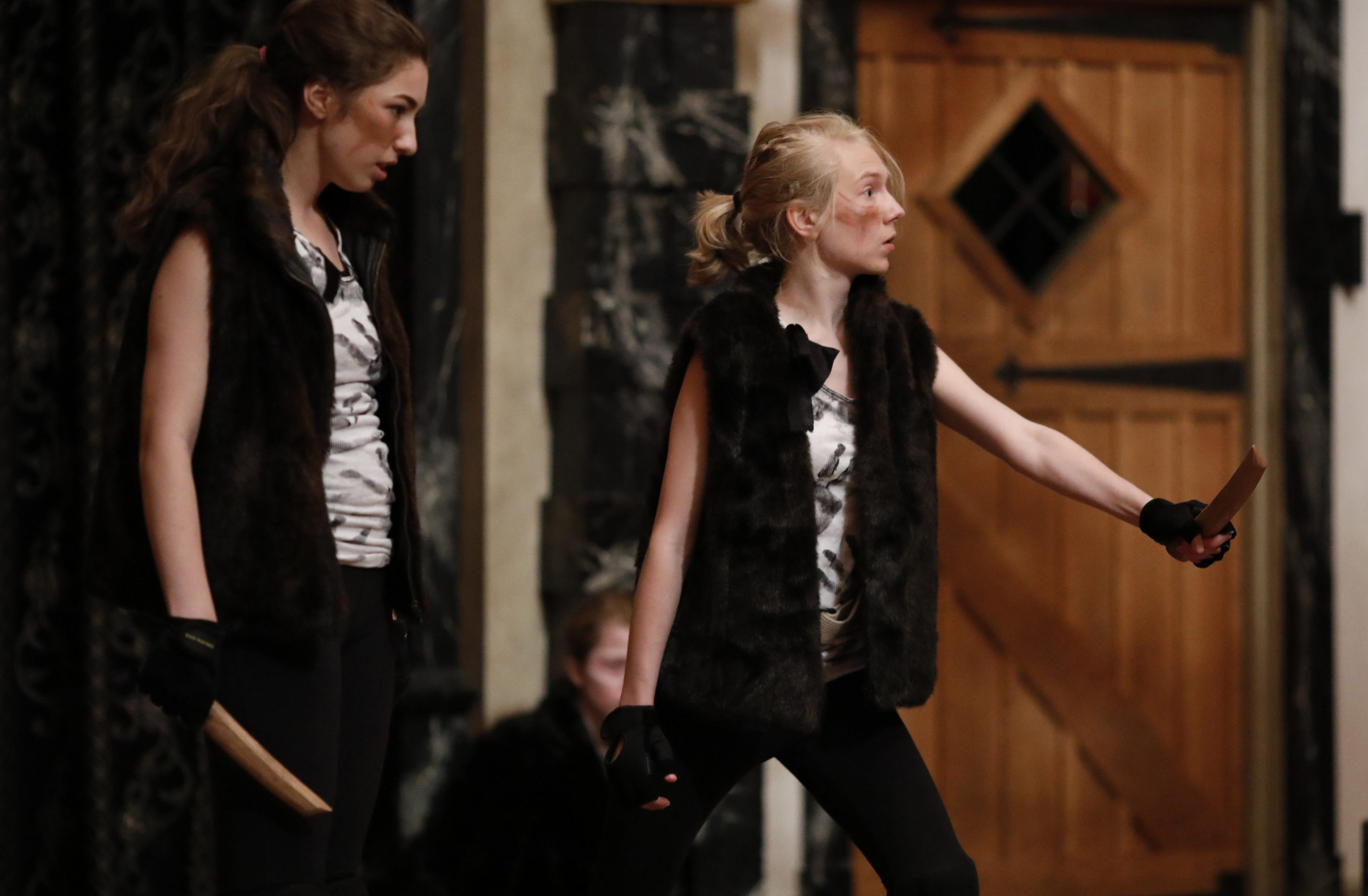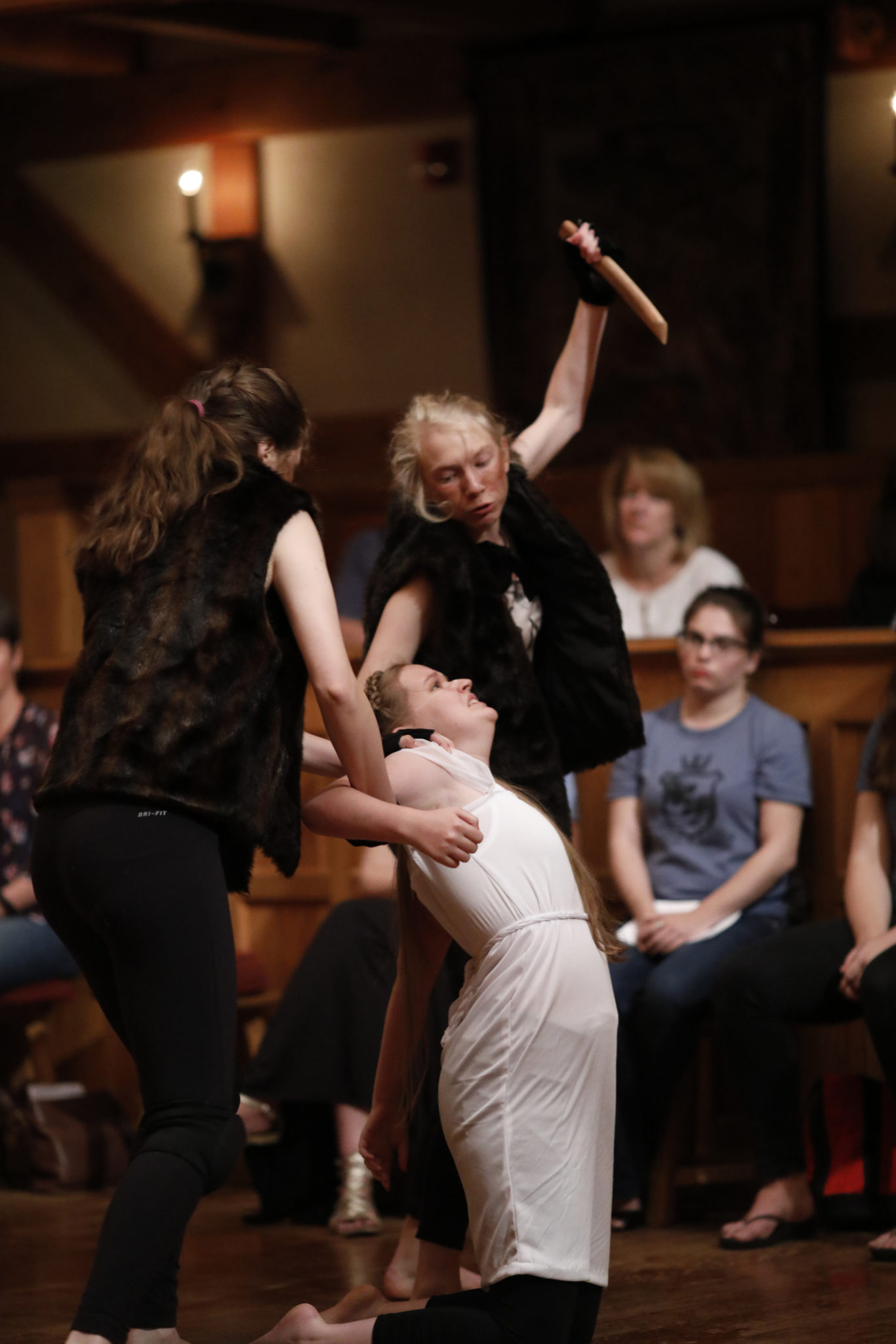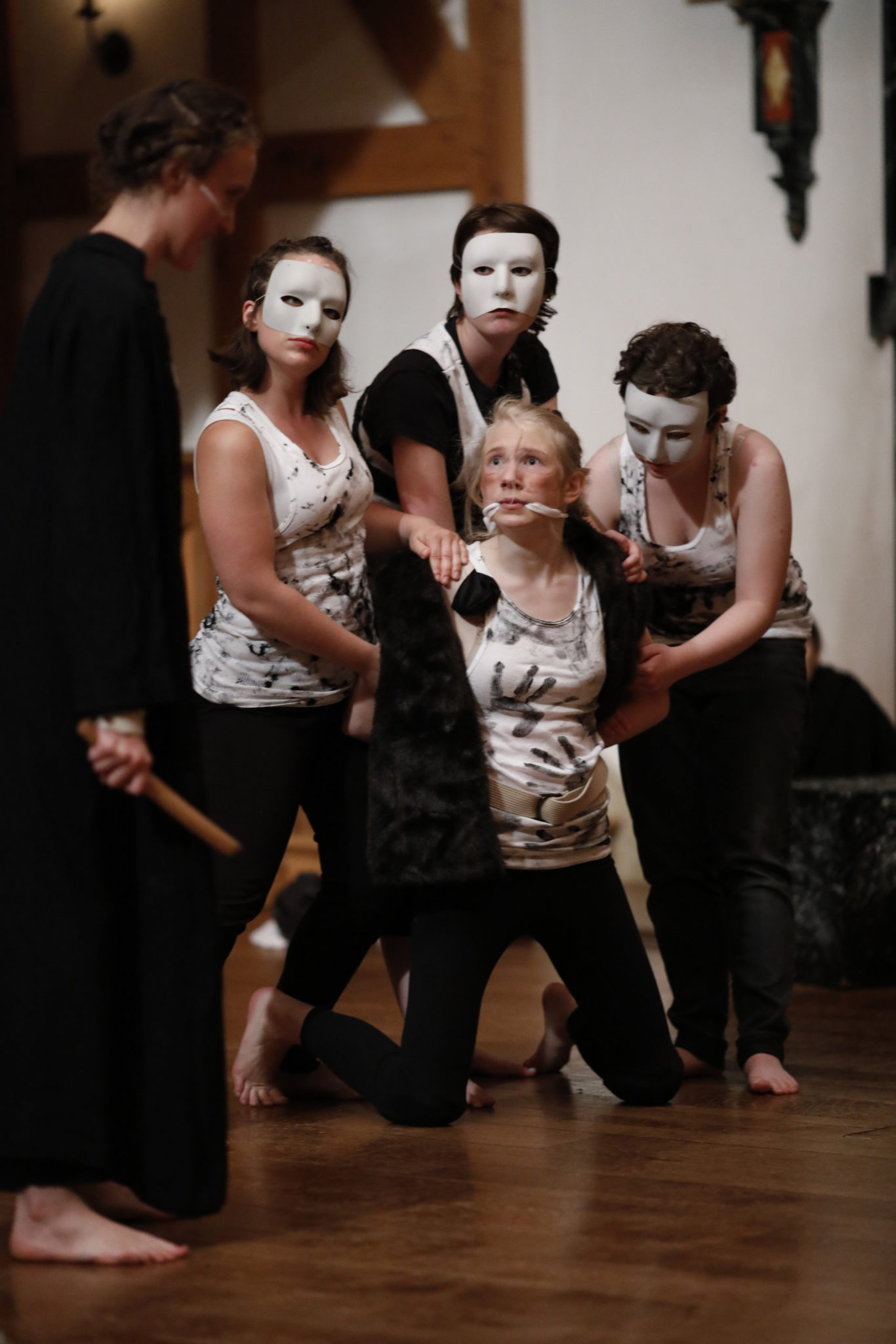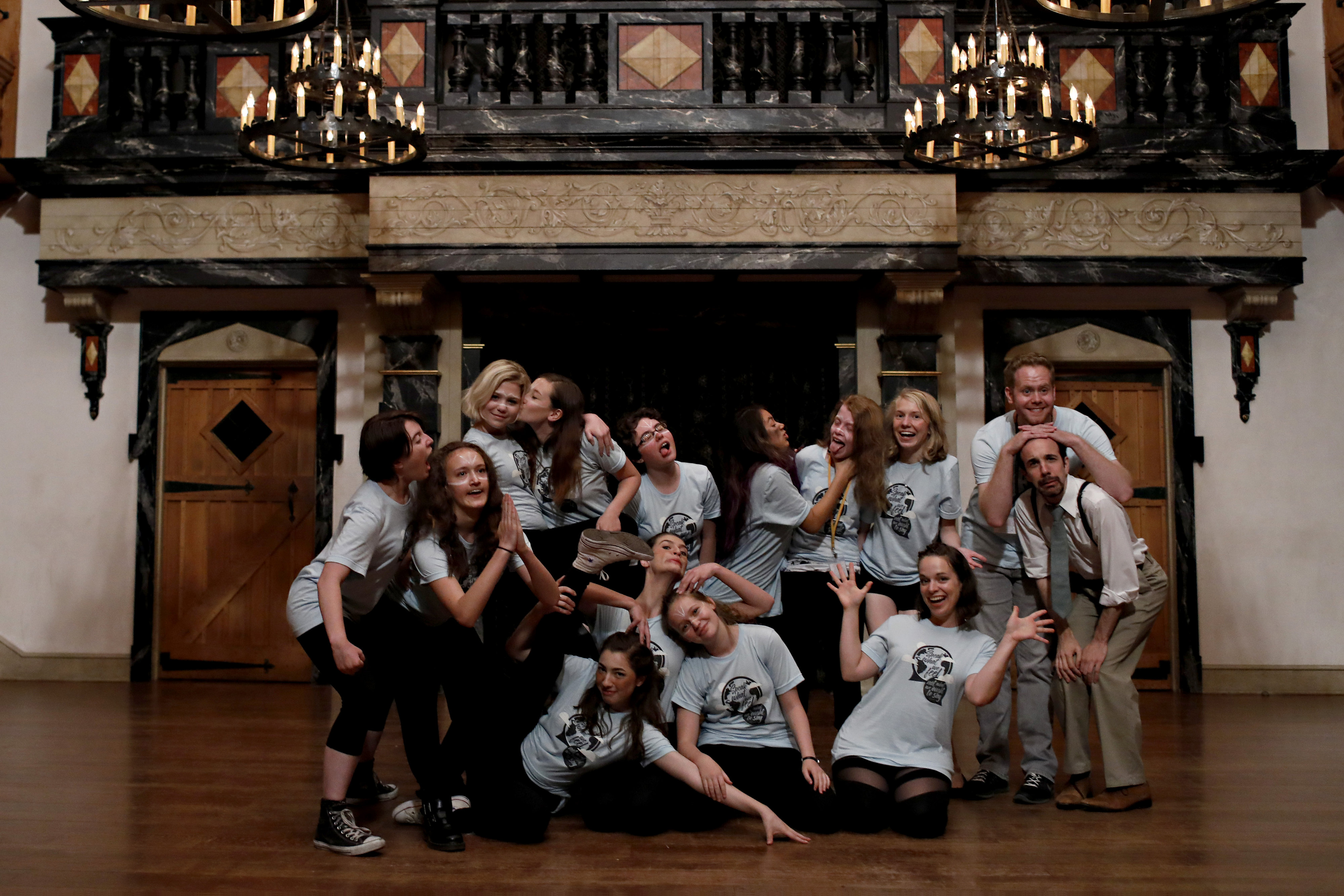One week into Love’s Labour’s, and the show is all blocked! And so far, things are looking good. Funny, though, how different from Titus this play is. First of all, this play contains a significantly smaller number of severed limbs. Come to think of it, I actually don’t think Love’s Labour’s Lost has any severed limbs. I mean, unless we make some very bizarre staging choices. What a sea change this is for me.

Another difference, though, is that I’m not acting in the show this time. Sure, it makes me a little more disconnected from the action on stage. Every time Andrew calls place, it take me a second to remember that my place is off stage. In some ways, that has been quite liberating. Now that I’m not focused on my own line memorization and scansion, I can help the campers out with their text and scenes. Plus, I have enough time to go about gathering props and costumes, AND sleep almost enough! No more sewing blood packs until 2am! And this group of campers is so delightful. They are so eager to dive into the show; you should have seen how excited they were when they saw me carry in the prop bow and arrow for the hunting scene. This group is Pure and Good.
That beings said, I still appreciate the work I got to do on Titus, despite the fact that it was a little more stressful. In fact, in retrospect, I learned a lot more from that show than I originally thought. One of the most interesting discoveries I made after doing Titus was actually about a seemingly random topic: my fashion sense.

So, I wear a lot of lace.
Most of my wardrobe involves pink dressers and flowy floral tops.
My style in a word: “cute”
Dainty, feminine, innocent- all words that people use to describe my clothing. And to describe the way I move.
The “cuteness” I express physically, though, doesn’t really have much to do with my fashion sense. It is just a response to anxiety. When I am nervous, I get smaller. I move more gently. My eyes get wider. My voice jumps like two octaves. Basically, I express any trait associated with femininity. It is socially acceptable that I, a woman, perform femininity. For me, femininity is safe. Femininity is what I always fall back into.
That became somewhat of a challenge when I stepped into the to role of Chiron for Titus Andronicus. Not only is Chiron a man, but he is also a man who is bent on showing off his masculine power. I’m not usually cast in roles like this. I’m usually cast as an innocent young woman, which, considering all the pastels I wear in my daily life, is really no surprise. This is the first time I’ve ever been cast in a role not because the director thought I would be good in it but because, well, someone’s gotta play that role. And even then, my extreme femininity has still been a problem before. About two years ago, when I played Anne Frank, there was one note I got repeatedly: my voice was too high. If I was overdoing femininity as a seventeen year old playing a thirteen year old girl in a coming of age story that is very much about her discovering her femininity, how was I going to deal with playing a Goth?
Multiple times in the process, I was told I was being “too cute” and needed to change my portrayal of the character to be older, tougher, and all in all, less adorable. My first response to this note, like anyone who is actually just a ball of anxiety covered in a lacy dress, was guilt and fear. After all, this experience is about the campers. I don’t want to ruin the whole play by sucking. Am I a bad actor? (a thought that is scary for anyone going into theater) But the concept of “bad actor” is kind of a myth in the education stage. There are some things I’m good at and others I’m not, but eventually I can learn. If I’m not good at playing men, it’s probably because I don’t have much practice. And when I look back on my theater experience, I realize I really haven’t. I have been typecast as the cute, spritely girl. Which can actually be useful for Early Modern stuff because Shakespeare writes a lot of cute, spritely girls. It’s already landed me some pretty great roles: Miranda in The Tempest, Juliet in Romeo and Juliet, Audrey in As You Like It (who, though not a main character, was a super fun role to play!) But would I be cast as Iago? Like, ever? And I don’t mean in a super stylized production of Othello where the director is like, “I wanna try a really different Iago played by a tiny blonde girl who looks like the most harm she could ever do to anyone is smile at them too aggressively.” At this point, probably not. I’ve been taught throughout my whole life that the best thing for me to be is small, quiet, and nice. After nineteen years of that kind of conditioning, it’s really hard to be anything else.
Now I don’t want to sound like, “If I’m a bad actor, it’s society’s fault!” If I’m not good at playing men, I can learn to get better. I will be working on presenting masculinity in my voice and body for this role. However, I think the learning process will be long and difficult because it will involve a lot of unlearning how I was taught to be in the world.

But there’s another femininity roadblock that made me think less about myself, and more about society. People have told me before that when I’m saying something serious or meaningful they just “can’t take me seriously” when I’m wearing that cute little floral dress. The campers, too, noticed a trend with my clothing. One time I wore a black shirt to rehearsal, instead of my usual pastels, and they were shocked. It was harder for everyone to believe I was a villain when I was wearing pink. But like, why? Why is feminine inherently less serious than masculine? Why does my gender expression get in the way of how people view me?
And I know there’s an easy option: just change my style. No one is MAKING wear those dresses. I just like them. I would be upset if I had to stop, but it wouldn’t ruin my life. But I shouldn’t HAVE to do that. I shouldn’t have to PROVE to the world that I deserve respect. I would like people to respect me regardless of how feminine my clothes are. And this issue affects me minimally compared to the way it affects some. I mean, consider how a trans woman with feminine gender expression might feel. If she doesn’t dress in a feminine way, many people will not take her seriously as a woman. But if she does dress in a feminine way, many people will not take her seriously as a person.
Overall, during the Titus rehearsal process, I learned a number of things:
- I need to practice walking and talking like a man if I expect to get a role that ISN’T a wide-eyed ingenue. And that’s not yet a comfortable thing for me.
2. It’s hard for people to take your threats of violence seriously when you’re wearing a shirt covered in pictures of bunnies wearing blue bows. (But I regret nothing. I seriously love that shirt and I strive to be a good enough actor one day that I can be intimidating regardless of the fact that I am covered in tiny rabbits.)
The basic take away was this: my gender expression does not make me weak. My physicality might. My gender expression is something I choose to flaunt. My physicality is something that, for the most part, I do unconsciously. I dress in a feminine way because I want to. I act in a feminine way because I learned to. Not only doing I think these discoveries will help me going forward in my life as an actor, but they also helped me better understand myself and my behaviors. I am so thankful to have had to opportunity to work on Titus and make these discoveries. Had I not been an intern for this show, there’s no way I would ever have been cast as Chiron, and I would never have to call my femininity into question. This experience helped me remember that I can be tough regardless of what my clothes look like. As Alli Glenzer teaches the campers, I am enough! I may be cute, but I’m still strong. And the two have nothing to do with each other.


